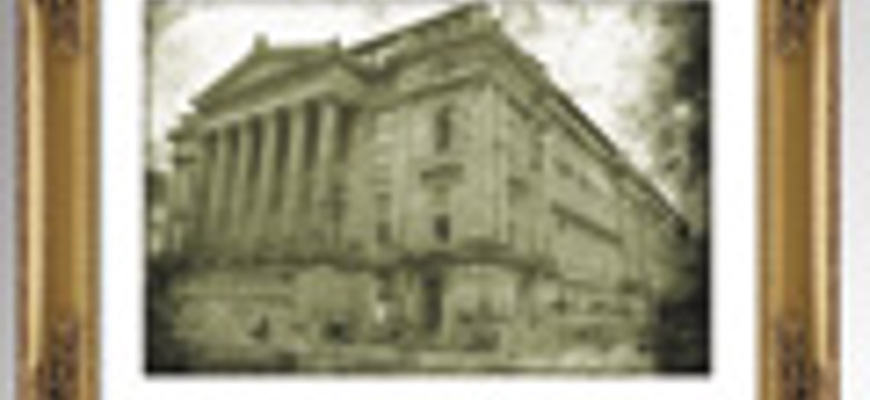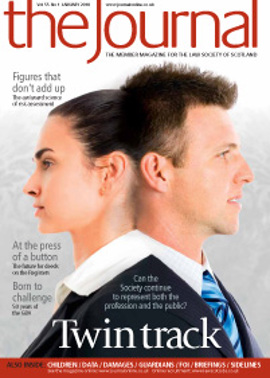Half a century of strife

If anyone ever makes Glasgow Bar Association: The Movie – and of course nobody ever will – then the soundtrack will be big band music. Live from the Berkeley Ballroom in the 1950s. Bobby Jones Band in full flow. The dance floor a vision of swinging, swooning, post-war euphoria; nylons, slick hair, wide lapels and ex-army ’taches. A man called Harry Flowers holding the clarinet up at shoulder height, playing and paying his way through his apprenticeship as a lawyer.
The backdrop will be Lyons tea-rooms, or the basement coffee room in the Trades House where a Glengarry biscuit, a coffee and a cigarette can be had for 6d from waitresses who surreptitiously run customers’ lines to the bookies. Some of the action will take place in the old sheriff court in Ingram Street, a decrepit, overcrowded building commonly described as a “Victorian toilet”, where boys are still being pulled from court to be birched over the birching stool by burly coppers, who carry out the sentence almost instantly to stave off an appeal.
It is a place where there are no rooms to see clients, no money to pay lawyers and the poor are effectively defended by the poor. Where for financial reasons very few plead not guilty and where the hustle and bustle, the rhythm, of everyday life pauses once momentarily, and memorably, as a man hurls himself to his death from the balcony moments after seeing his lawyer.
All this in a city bursting with life and with crime. In a country that still thinks it appropriate to fund the defence of an accused by the 14th century poor’s roll. Each lawyer given one two-week stint per year, covering hundreds of cases including murder, and all to be paid for by a stipend of £30. Where counsel receive two and half guineas a day and a free lunch. Where the whole thing is so criminally, hopelessly and unfairly underfunded that counsel once came striding into the court bar with his wig and waistcoat and fob watch a-swinging, looking for instructions on an imminent trial and left with an envelope on which the words “it’s a murder” had been laconically written.
If anyone ever makes Glasgow Bar Association: The Movie – and why would anyone? – the opening scenes will show an elderly man in a long coat and a brimmed hat, squeezing himself into Aileen’s Room, the GBA office in Glasgow Sheriff Court. His name is Sheriff Jim Murphy and he will be the narrator, talking of events 50 years ago. He will take his hat off, set down his bag and adjust his hearing aid as almost next door in the common room young lawyers sit and talk of, amongst other things, the latest clash between the GBA and the Law Society.
And while business in the busiest criminal courts in Europe, all marble walls and cool clear spaces, gets underway, ghosts will begin to stir amongst the piles of legal aid forms. The most powerful of those being that of the clarinet-playing legal apprentice Harry Flowers, in the mid-1950s a bowler-hatted qualified solicitor arriving at court on his Zundapp Bella motor scooter. Near the end of the decade, returning from holiday – was it America? – sick of the unfairness of the Scottish legal situation, saying: “We have to start our own organisation”.
There will be talk of that first historic advert in the Glasgow Herald. Carried on Monday, 19 October 1959, as Ben-Hur was about to open in the cinemas and, appropriately perhaps, the first photos were being beamed back from the dark side of the moon. “Proposed Glasgow Bar Association”, it stated. “A meeting of solicitors to be held within the North British Hotel”.
Bar Association? Even the name with its modern, American overtones was an irritation to the powers-that-be. If there is to be a voice-over to this movie then Jim Murphy will recall that Tom Gunn was appointed the first ever President of the new GBA. Why? “He didn’t look like a hot-head.” If there is to be a nemesis in this movie it is the Government, which has approved civil legal aid but not criminal. It is the newly formed Law Society of Scotland. Establishment, old school, elders of the Kirk and seemingly blind to the complaints of a handful of lawyers who defend criminals in appalling surroundings and with no money. And, to a certain extent, it is the Royal Faculty of Procurators, then the most powerful legal body in Glasgow but accused of “rolling over” the criminal solicitors’ needs.
It is precisely because he at least seems one of them, that Tom Gunn with his ex-First World War officer’s bearing, his double-breasted pin-striped suit, his ’tache and his Brylcreem is chosen, while the man behind it all, Harry Flowers, a socialist, will be the association’s secretary. And there will be other characters. John S Boyle, the powerhouse behind the push for legal aid, who when faced with refusals to provide Glasgow court lawyers with a common room, said: “Convert that court then.” (They eventually did.) There will be the most famous lawyer of his time: Lawrence Get-Me-Dowdall, whose presence was more than merely decorative; and the former swimming champion and perhaps the sole female criminal lawyer in Scotland, Winnie Ewing. There will be Keith Bovey and many others including Jim Murphy, who will become the first GBA lawyer to make it to the bench. And the aim will be to improve the lot of the lowest of the legal low, the criminal solicitors and their clients, to fight to end the poor’s roll and bring in legal aid for criminal cases, to improve facilities and to have Glasgow solicitors included in appointments to the shrieval bench.
If anybody ever makes Glasgow Bar Association: The Movie – and anything is possible these days – then the five years that follow will be all crash bang wallop action. Huddled meetings in Glasgow flats, carefully-composed but stinging letters to the editor, members of the GBA pitching up at Law Society AGMs and firing in last minute motions. There will be raised voices, cold reactions, moments when the piano stops playing and tumbleweed rolls across the floor. There will be a strike. The first ever by Scottish solicitors. Mentioned in Parliament. There will be endless and thorough briefing of MPs and then there will be a result. Legal aid. For criminal cases. In 1964. Not as we know it today, but a start.
If there is to be a dramatic moment in this movie then it will take place in the House of Commons during the second reading of the Criminal Justice (Scotland) Bill. Every single Scottish MP has been armed with a detailed report from the GBA. The organisation is mentioned repeatedly. That bill contains clause 47, ushering in criminal legal aid. And MP William Hannan (Glasgow Maryhill) will thunder in response to a member of the Government:
“I invite him to come to Glasgow on any day and go unannounced to see what goes on in the courts. The corridors and hallways are thronged with people. This is no exaggeration. Police witnesses who ought to be out on duty are there wasting the whole day because cases timed for ten o’clock in the morning do not come on that day at all. Witnesses are there and they lose employment, with the consequent trouble of completing forms in order to make claims. Solicitors reporting at ten o’clock in the morning for their cases find that there are as many as 27 diets down for the same time. Is this the administration of justice? Is this carrying out the law?... A solicitor does not know a few days or even hours before a case who will be the fiscal who is to handle it. The building itself is outdated and outmoded. It is dim, dingy and dark. The basement is in use and children are shepherded there to wait.
“As things are, more than 90 per cent of people, no matter how strongly they may feel about their innocence, find their solicitor suggesting, … ‘you know what it is. You had better plead guilty, hadn’t you?’”
If anyone ever makes Glasgow Bar Association: The Movie, it would have to be a movie because only a fool would ever try and make GBA: The Documentary. No minutes were made of that first meeting, or of the second. The association’s records were taken home by somebody, sometime. Harry Flowers is of course dead, as is John S Boyle. Dowdall’s biography Get Me Dowdall makes no mention of the formation of the Glasgow Bar Association and the fights that were to follow. Winnie Ewing’s biography concentrates mainly on the glittering career that saw her become one of the most famous Scots in Europe.
Once upon a time the story was told in thousands of brown envelopes containing millions of newspaper cuttings in The Herald Library. But they are in storage now. Virtually lost. All that’s left of the early years is buried in the microfiche collection of the Mitchell Library, entombed in an archaic system, virtually impenetrable, hand-cranked and weakly indexed. Computerised records start in 1989, but stripped of their context, and recorded in grim sparse type, are dry and dull. They don’t bring to life former GBA president Ross Harper’s significant contribution to making Scottish legal aid into a system that was envied worldwide. They don’t have details of the day the BBC devoted six hours of live programming to a teach-in by the GBA at Glasgow University, attended by stars and featuring, to nationwide gasps, a bank robber on the run in England. Yet they do minute the fights that followed. They contain in letters and small stories the constant role of the GBA and its presidents as a bulwark, a thorn in the side of the establishment even, a constant voice, usually in the wilderness, sometimes alone, often unpopular. A tradition that continues to this very day. To the sound, one would hope, of Harry Flowers’ Big Band’s clarinet.
Ron Mackenna is a solicitor with Grady & Co, Glasgow, and a member of the Glasgow Bar Association
In this issue
- Forward thinking
- Renewal of transitional guardianships
- End the navel-gazing
- Who speaks for lawyers?
- Reasons to be hopeful
- The full picture
- Hearing and speaking
- Law of unintended consequences
- More prejudicial than probative?
- One giant leap
- If the cap fits
- Half a century of strife
- From the Brussels office
- Law reform update
- Send in the SaaS
- Ask Ash
- Words and sentences
- Two in one
- Enough to turn you to drink
- Uncertain security
- Protections with legs
- Working for the estate
- Home defences
- Splitting from the taxman
- Scottish Solicitors' Discipline Tribunal
- Website review
- Book reviews
- Route to freedom
- Steady as she goes is market forecast






